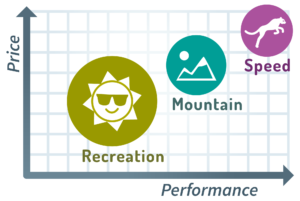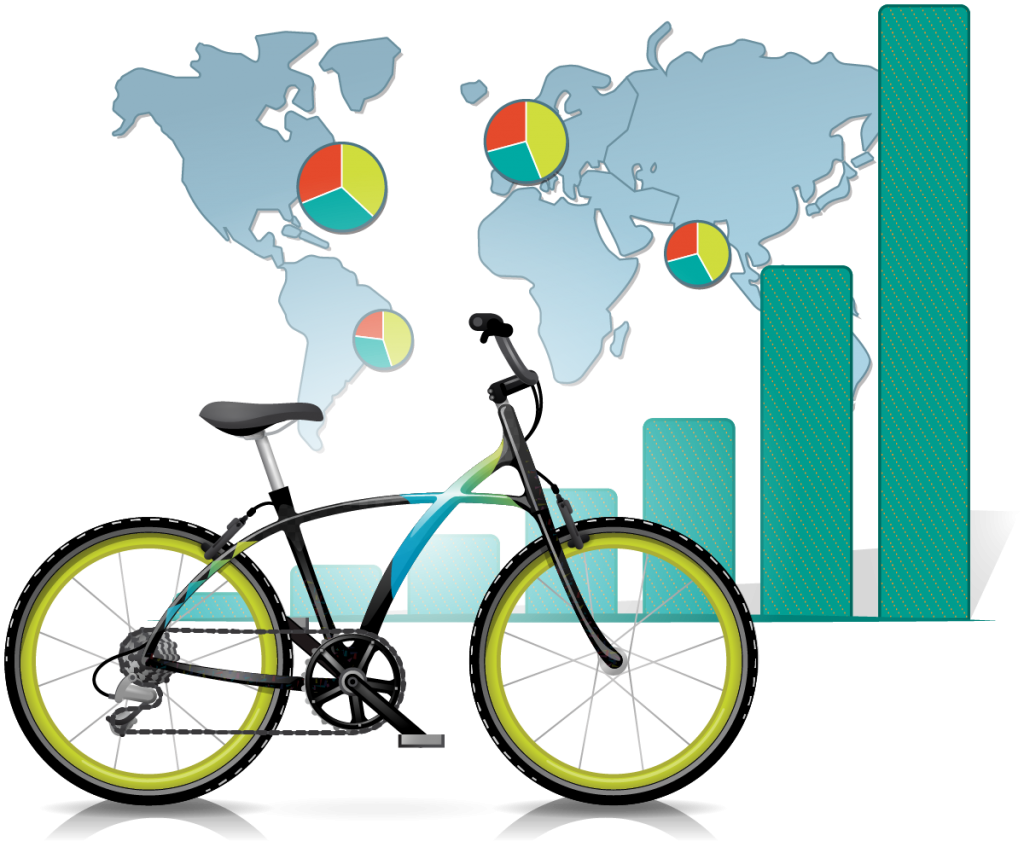
EDUCATIONAL GAMES FOR BUSINESS
Conscious Capitalism®
Develop leaders who build the sustainable businesses of the future, benefiting all stakeholders.
The Conscious Capitalism simulation challenges students to choose between the path of least resistance or working hard to build a conscious business. Players act as executive teams making realistic business decisions for a whole enterprise. Students must consider all the firm’s stakeholders and deal with ethical, environmental, and sustainability issues alongside the usual challenges of running a business.
Each decision round played builds upon knowledge gained in the previous round. Students learn to interpret market feedback, analyze competitors’ moves, and make quick strategic adjustments. Marketplace Microsimulations are available at critical points of the simulation to give students targeted practice in key business concepts.
Conscious Capitalism is available in two product storylines, 3D-printed bikes or personal computers. *Language available in Bike edition.
Typical courses
Entrepreneurship, corporate governance, and capstone business courses
Educational level / Class size
Ideal for small to large classes of third or fourth year undergraduates or MBAs
Decision rounds
6 decision rounds of 2-3 hours
Languages
English*, Spanish*, Polish, Korean, Russian
Teach Your Preferred Sustainability Model
Our one-of-a-kind simulation was built in partnership with Conscious Capitalism®, Inc. Their core principles embody the spirit of Triple Bottom Line, ESG, SDG, SRI and other responsible management models. Whatever your preferred framework, you can teach it with the Conscious Capitalism Business Simulation.
Learn more in the AACSB article Training Leaders to Manage Societal Impact.

Lead Like a Conscious Entrepreneur
Business Strategy
Formulate a socially, environmentally, and ethically responsible business strategy to profitably serve up to 3 market segments.
Product Marketing
Analyze broad market data to create bicycles from a wide set of components, then price and promote them for the targeted segments. Plan R&D to balance customer needs, profit, and sustainability.
Sales Channel
In up to 4 markets, manage a sales strategy with traditional and internet channels based on market potential and resources. Hire and train sales staff to develop demand.
Sustainable Production
Project demand and set up just-in-time production. Invest in quality and system improvements to positively impact customers, employees, and the environment.
Human Resources
Recruit the best sales force and production workers with competitive compensation packages. Build programs to empower and involve employees to maximize productivity.
Financial Management
Utilize financial statements and projections, and manage debt and equity to build a profitable firm. Discover that to benefit all stakeholders a business must be successful, and benefiting all stakeholders leads to a successful business.
Conscious Entrepreneurship
Explore the costs and benefits of corporate social responsibility within a startup. Simultaneously consider the owners, employees, customers, community, and environment to create greater business value.
Explore this simulation with a  quick demo.
quick demo.
Realistic Experience
Student teams start up new businesses and compete in a simulated market. They are challenged to develop a niche market based on newly available technology.
Your students study industry data and formulate a business strategy. They produce and sell products, gaining experience by testing ideas and learning from the results.

Learning content is gradually and purposefully added as the market evolves. Based on customer feedback, competitor analysis, and financial reports, students manage their strategy in a dynamic, competitive environment.

Balanced Scorecard Metrics
To ensure that students learn to manage all aspects of Conscious Capitalism, a Balanced Scorecard is used to evaluate team performance.
- Financial performance
- Market performance
- Marketing effectiveness
- HR management
- Manufacturing productivity
- Creation of wealth
- Investment in the firm’s future
- Asset management
- Financial risk
- Reputation
- CC summary report
Class Size Options
 Play Against Classmates
Play Against Classmates
Because students compete against their classmates, all teams advance through the game in sync. The friendly rivalry creates a stimulating and engaging experience.
Ideal for small to large classes of third or fourth year undergraduates or MBAs.
Teams of 4-5 students work well. Playing in teams cultivates soft skills such as leadership and communication.
 Play Against the Computer
Play Against the Computer
Teams compete against the computer and progress at their own pace, which is great for classes needing low overhead.
Ideal for small to large classes of third or fourth year undergraduates.
Teams of 4-5 students work well. But students can play individually, eliminating the need to arrange teams, which may be impractical in large classes.
Engaging Storyline
Challenge your students to develop a new, niche market using an advanced 3D printing technology to build carbon fiber bike frames. The new bikes are strong, lightweight, and can be custom tailored for each rider. Bikes can be built to demand, eliminating most of the inventory that would otherwise be held, and reducing distribution costs. The new bikes promise to create a brand new market opportunity. Will your students reshape the bike industry?

Not sure if Conscious Capitalism® is right for you?
Compare our other simulations for Entrepreneurship courses.
Why Choose Marketplace?

Turnkey Solution
Comprehensive tools to setup, monitor, and grade. Student work is self-guided with built-in instruction based upon a sound teaching methodology refined over 30 years.

Easy to Access
Cloud-based, works on any common Internet browser and operating system. Meets the WCAG 2.0 AA accessibility requirements.

Support 7 Days a Week
Our responsive staff provide comprehensive support by phone, email, or web-conferencing to ensure that you and your students get the most out of Marketplace.

 Play Against Classmates
Play Against Classmates Play Against the Computer
Play Against the Computer